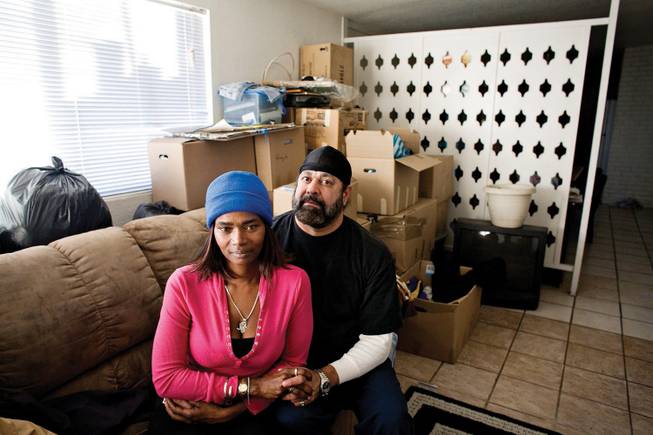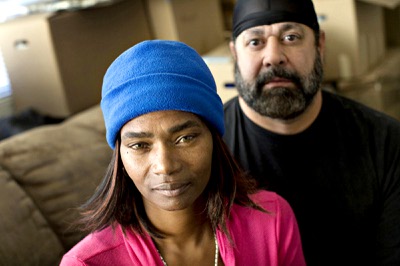
Joy Lee and partner John Clark were to be evicted on Christmas Eve. Other Culinary Union members are in similar situations.
Friday, Dec. 25, 2009 | 2 a.m.
Thousands of unemployed and underemployed Las Vegans lined up outside in the brisk cold, waiting on Christmas hams, instant potatoes and canned goods.
The venue wasn’t Catholic Charities or a city food bank. It was the Culinary Training Academy.
Members of the Culinary Union, the state’s largest and most powerful union, were registering for food baskets. The scene was a harsh reminder of how deep the recession has cut into the fabric of Southern Nevada’s economy.
In past downturns, members survived with mere scratches. Their union played a key role in setting the standard of living for Southern Nevada, making it the place where a housekeeper owns her home.
This year, these workers, the very backbone of the gaming industry, are struggling. And the union’s promise of a “Las Vegas dream” for the middle class seems in jeopardy.
The Culinary, once the fastest-growing private-sector local in the country, estimates it has lost about 10 percent of its members.
D. Taylor, head of the Culinary, doesn’t pull punches. “Has the Las Vegas dream taken a hit, like the rest of the city?” he said. “No question.”
He said the union is doing its best to keep members afloat, but the shock still feels fresh.
“For our members, it’s been really traumatic,” Taylor said. “This has been a sustained hit, and that’s led to a tremendous amount of insecurity and trepidation.”
The workers themselves are cautiously optimistic. Some see a future here. Others do not.
Below, portraits of the union’s unemployed and underemployed:
Joy Lee and John Clark
Joy Lee and John Clark are facing eviction.
On Wednesday, the one-time laundry workers boxed up their belongings and waited for the power company to turn off the lights in their rental home.
“I really don’t know what we’re going to do,” Lee said, “but we’re going to make it.”
“We stay together,” Clark said. “That’s how we stay strong.”
The couple came to Las Vegas from Riverside, Calif., in 2002 to look after Clark’s ill mother. Both got jobs at Mission Industries, the commercial laundry responsible for cleaning much of the Strip’s linen. Lee worked the presses, and Clark filled laundry orders. The work paid decent wages and generous benefits. Later, Clark took up construction. The couple moved into a rental home, their son entered high school and their daughter enrolled at UNLV.
Then the recession hit. Mission halved Lee’s hours, before closing the presses at her plant altogether. As for Clark, construction slowed up and down the Strip and he soon found himself jobless.
By November, Clark’s unemployment benefits had run out, and Lee was fighting the state unemployment office. Officials froze her benefits because they said she failed to report income from her time at the laundry. Neither has been able to find work.
With no money coming in, the couple fell behind on the rent, and their landlord served an eviction notice.
What’s next? A weekly motel.
Lee, 43, and Clark, 46, want to see their daughter graduate from UNLV but are considering moving to Atlanta to be closer to Lee’s mother.
“I’m not tired of Vegas,” Clark said, “but when it gets this bad, you think about going to other places and trying new things.”
Anna Sotelo
Without thinking, Anna Sotelo remembers the date she was laid off.
“Sept. 6,” she said. “You never forget that.”
Her voice shakes when she talks about it. After 23 years as a waitress at the Tropicana, her serving career came to an end this fall when the casino closed its cafe. Sotelo, 63, had become an institution at the Culinary. Members call her “Tropicana Anna.”
She can hardly bear the thought of not working.
“I never thought it would come down to this after all these years,” she said. “I’m keeping a stiff upper lip and hoping that after the holidays something will come up.”
A Chicago native, Sotelo first came to Las Vegas in 1981 on a vacation with her mother. Within three years she moved and found waitressing work, first at the Castaways and then the Tropicana. “I felt good,” she said. “It was wonderful.”
She carved out a middle-class life and became active in the union. She embraced her role as a shop steward. “I saw how people were afraid of the bosses and wouldn’t stick up for themselves,” Sotelo said. “I would talk to them and get them involved.”
Over the years, Sotelo said corporate mergers and consolidation affected the workforce — and hurt service.
“The companies got greedy, and they were just looking out for themselves, not the employees,” she said. “We are what helps make Vegas Vegas. They started paying more attention to the investors than the people.”
Sotelo said in the last year Tropicana managers forced servers to take on more tables and more responsibility. “If you’re only working with so much, you can only be so smiley-smiley,” she said.
Since September, Sotelo has dipped into her savings to supplement unemployment benefits. She’s considering applying for Social Security early.
“I would love to keep working,” Sotelo said. “But I might end up going back to Chicago, because there at least I know I’ll have somewhere to live.”
Sandra Stone
Sandra Stone is draining her savings account. A veteran banquet server, Stone barely cracks 10 hours of work some months. When the recession killed much of the city’s convention and meeting business, banquets were an attendant casualty.
“It’s horrible,” she said. “We have no work.”
She spent $15,000 of her savings over the last year to stay afloat. The recession has made her long for the Las Vegas of her youth.
Stone arrived in Las Vegas in 1963. As a high school graduation present, her mother drove her here from Miami Beach, Fla. A month later, she met and married her husband, a card dealer at the Mint.
Stone worked as a cocktail waitress at the California Club in the ’70s and transferred to banquets at Harrah’s in the ’80s. She and her husband raised two sons. “It afforded me a wonderful way to support myself and my family,” she said.
Stone, 64, has seen Las Vegas weather three recessions, but said this downturn is like no other.
“There’s no comparison,” she said. “People are losing their homes. It’s nothing like what you saw in the past.”
Having siphoned her savings, Stone said she’s delaying retirement and travel plans.
“My dreams have been put on hold,” she said. “I’m going to have to continue to work because of this.”
Andy Miera
Andy Miera knew the bad times were coming.
As the housing bubble grew, the banquet bartender said he had a hard time qualifying to buy a condo.
“I thought to myself, ‘There’s no way an average worker can afford these houses. How in the heck can these real estate people raise the prices so high?’ ” Miera said. “Everything was shooting up so high at such a fast pace that I knew sooner or later it was going to crash. And it destroyed Las Vegas.”
Miera, 50, grew up in North Las Vegas and has worked in casinos for nearly 30 years. He tended bar at the Fremont, the Silver Nugget and Binion’s Horseshoe, where he took part in a historic strike. He has worked banquets at Mandalay Bay since 2003, but business is so slow he’s now collecting unemployment.
Miera said his income dropped $25,000 this year. Also, because he’s failed to meet the number of requisite hours for employer-paid health care, Miera has to make up the cost difference with his own money. He owes $400 in the next two months to cover himself and his three children.
One bright spot: Miera is one of more than 100 who have purchased homes through the Culinary’s housing trust fund. The union provides financial counseling and a down-payment loan to members who qualify.
The tumbling real estate market put a house within reach, he said.
Miera said he’s optimistic about the future.
“The promise of a better life is still there but it’s been knocked down so hard and so fast that a lot of people have left,” he said. “Vegas will come back but it’s going to be a slow process.”





Join the Discussion:
Check this out for a full explanation of our conversion to the LiveFyre commenting system and instructions on how to sign up for an account.
Full comments policy